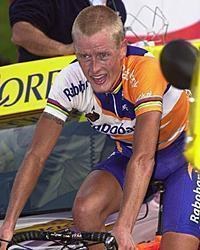
Recently on Cyclingnews.com |
91st Tour de France - July 3-25, 2004
An interview with Michael Rasmussen, July 10, 2004
To Rule the Roost
Former world mountain bike champion Michael "Chicken" Rasmussen now finds himself in a co-leadership role on one the world's biggest and best teams at Rabobank, and is in the midst of tackling his first Tour de France with the form of his life. But for this year at least, a good showing at Le Tour isn't all he wants. Story by Anthony Tan.
Michael Rasmussen
Age: 30 Career highlights2004 - Rabobank1st, Mountains classification, Dauphiné Libéré 2003 - Rabobank1st, Mountains classification, Volta a Catalunya 2002 - Team CSC Tiscali1st, Stage 4, Vuelta a Burgos |
Cyclingnews: Why did the Chicken cross the road?
Michael Rasmussen: I always wanted to compete against the best, and we have to be honest and say that road cycling is the 'Formula 1' of cycling.
CROSSING PATHS FROM THE DIRT TO THE ROAD THREE YEARS AGO, Michael Rasmussen's switch has proved both a safe and lucrative one. Not only that, but the 30 year-old Dane's rise to the top echelon of road cycling has been startlingly swift. The past 18 months, has seen him well inside the top 10 at the Vuelta a España and two hors categorie tours, as well as winning the mountains classification prizes at the Dauphiné Libéré and Volta a Catalunya.
And in that time, Rasmussen won two mountain stages with great panache, his daring reminiscent of the glory days of a certain Italian by the name of Claudio Chiappucci.
"With the results, my ranking - and also my price - was going up as well"- Rasmussen on his atypically successful year as a neo-pro at CSC-Tiscali |
The first came on the seventh stage of the 2003 Vuelta, where he attacked his 10-man breakaway group that included eventual overall winner Roberto Heras, finishing atop the 16 kilometre climb of Cauterets all on his own. Then just a few weeks ago, Rasmussen successfully pulled off an audacious move with CSC's Ivan Basso on Stage 6 of the Dauphiné Libéré, where Chicken's 140 kilometre game of possum paid off in spades, leading to another memorable solo win.
With so much success so soon, you might be asking yourself, 'Why didn't Chicken cross the road even earlier?'
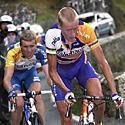
|
"Well, actually, I tried!" laughs Rasmussen, speaking from his home in northern Italy a few days before the Tour's official kick-off in Liège. "I was racing for an Italian amateur team in '98, but the way the rules were with the teams here [in Italy], they could only have two foreigners, and they they opted for riders that they could use for the whole season, as I still had my obligations on the mountain bike."
_______________________
After his MTB world's victory in 1999 (where he beat current world champion Filip Meirhaeghe and Miguel Martinez, who won the following year), it was only logical for the lanky Dane to stay on the dirt for another season in the hope of an Olympic gold medal in Sydney. But in 2000, Martinez was unstoppable, winning both Olympic and world titles in the cross-country events. Then, one year later at the 2001 MTB world's in Vail, Colorado, disaster struck.
Having established the winning move and in a two-man break with Canadian Roland Green, Rasmussen punctured at the worst possible moment when a second victory looked all but assured - Green went on to win what would turn out to be the first of two consecutive world championship victories, while Chicken waddled over the line for eleventh place. He's only ridden his mountain bike twice since.
"I don't miss it [mountain biking] at all," he says, still sounding a little scarred by the experience. "I enjoyed those years for sure; it was a great life, I travelled the world more than most people do in a lifetime, and I've got a lot of good friends and had a lot of good experiences from that.
"Levi is very calculating with his riding and he's very consistent - he's a diesel. I'm probably more explosive and I'll win and lose my time in a different way than he does."- Rasmussen on the situation of co-leadership within the team between himself and Levi Leipheimer |
"But at the same time, road cycling was always there in the background. I always wanted to compete against the best, and we have to be honest and say that road cycling is the 'Formula 1' of cycling... and Bjarne [Riis] gave me the opportunity to get started."
So after riding the remainder of 2001 as a stagiaire with CSC and 10 years on two fat tyres, Rasmussen dived into the world of 'Formula 1'.
_______________________
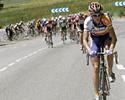
|
Fellow Dane and '96 Tour winner Riis saw the potential, and threw the neo-pro into his first Grand Tour at the service of Tyler Hamilton in the 2002 Giro d'Italia. Chicken took to the Giro like a duck to water, he and team-mate Carlos Sastre nursing Hamilton up the climbs after the American's spectacular opening week crash that saw him fracture his elbow. Ty hung tough to eventually finish second (the best finish by an American since Andy Hampsten's victory in 1988), while Sastre and Rasmussen were clearly the best of the rest from CSC. It was a trial by fire, and Chicken was cookin'.
Towards the end of the season, Rasmussen again found himself in top condition, taking a stage victory at the UCI 2.1 Vuelta a Burgos and finishing fourth overall, as well as three top five placings in the space of a month in some hard-fought Italian one-day races that included the Giro dell'Emilia and Giro del Veneto.
"And with the results, my ranking - and also my price - was going up as well," says Rasmussen. "Eventually, we [he and Bjarne Riis] couldn't agree on the right price, and Rabobank came in and were very eager; they've had [good] experiences with Danish riders in the past like Rolf Sorensen, so they had a lot of confidence I could do the job."
Rabobank were right. 2003 was easily his best year ever, finishing seventh overall in the Setmana Catalana, Vuelta al Pais Vasco and the Vuelta a España, as well as winning the mountains competition in Catalunya and a stage of the Vuelta.
Asked what drove his success, Rasmussen puts it down to a combination of things: "Basically, every time I went to a race last year, it was my second time at that race, and that actually helps a lot in that you've ridden the same roads before. Also, Rabobank gave me the opportunity to be the team captain in Setmana Catalana, Pays Basque and also the Vuelta. Of course, it added more pressure on me to perform, but at the same time, it gave me more confidence, and I think that's what it came down to."
_______________________
Other stuff
|
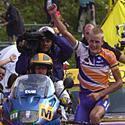
|
So did he believe a good ride at the 2004 Tour de France was possible after his performance at last year's Vuelta?
"Yeah, I certainly believed it is possible that I can do something similar in the Tour," he says. "My goal, however, is to win at stage - that has a higher priority than GC - but we're going to look at the standings at the bottom of the Pyrénées because so many things can happen in those first 12 days... " True, but Rabobank are expecting a lot from this lithe, lanky Dane.
About his rapid rise to the top of the pecking order (that's the last bad joke, I promise!), Chicken tells me the situation of co-leadership with American Levi Leipheimer suits him just fine, easing the pressure on both should one fail to perform: "I think it's a win-win situation," acknowledges Rasmussen.
"We have two different riding styles; Levi is very calculating with his riding and he's very consistent - he's a diesel. I'm probably more explosive and I'll win and lose my time in a different way than he does.
"But I'm not going to lose time on purpose," he cackles... "I'm sure that won't be necessary!"
After his brilliant stage win at this year's Dauphiné, coming back from a broken collarbone that saw him begin the race with just 15 days' racing in his legs, Chicken's actions speak as loud as his words. In fact, Rasmussen's already eyed off Stage 13 from Lannemezan to Plateau de Beille after a brief reconnoitre of the Pyrénées shortly before the Tour - which just happens to be on a parcours not dissimilar to that which he won on three weeks prior.
"Yeah definitely, that's one of the stages that I'd like to win... Well actually, I'd like to win any of the stages!" he giggles, "but that one there, for sure."
Being such a gifted grimpeur, you would expect Rasmussen to be delighted with the structure of this year's Tour with mountains on mountains stacked throughout the final week, but somewhat surprisingly, I hear almost the opposite:
"I'm not so sure I would be handicapped in they did have a 50 kilometre time trial in the first week. With the way it is now, you might have 50 riders separated by only a few minutes by the time we get to Limoges [Stage 10], so I think it's pretty limited how much liberty one will get."
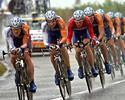
|
Conversely, when we speak of time trials - every pure climber's Achilles heel - and in particular, the final 55 kilometre race of truth around Besançon, Chicken seems to have no fear... At least for now, anyway.
"Well, that one [Stage 19] comes so late in the Tour, at that point you really know whether the Tour is already over or not," says Rasmussen. "If I'm not [high] on GC, that day is really a semi-rest day for me - but if I'm still high on the overall, whatever energy is left in the body at that time, I'll spend it on that day, that's for sure."
But for this year only, even more important than a high overall placing or even a stage win is this year's world road championships in Verona, Italy. The circuit, almost identical to that used five years ago for the 1999 World's, is just 20 kilometres away from where Rasmussen lives, where he rides the parcours 'at least once a week', dreaming of ruling the roost.
"There's not a day that passes by without me thinking of the world championships... if I'm going to be world champion, it's going to be in October," he says.
Editor's note: Michael Rasmussen is currently lying 37th on the general classification after Stage 6, 11'17 behind current race leader Thomas Voeckler.

